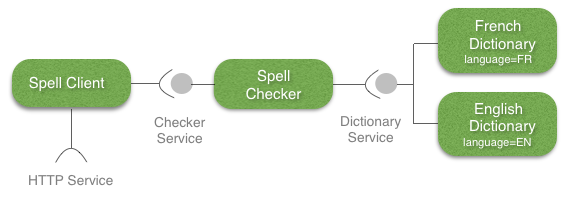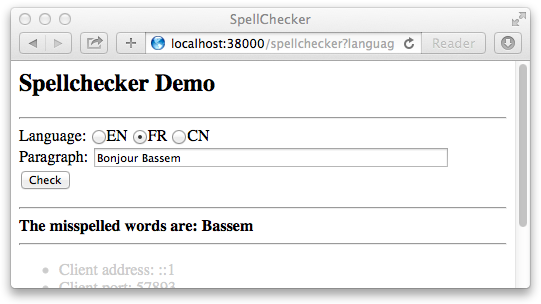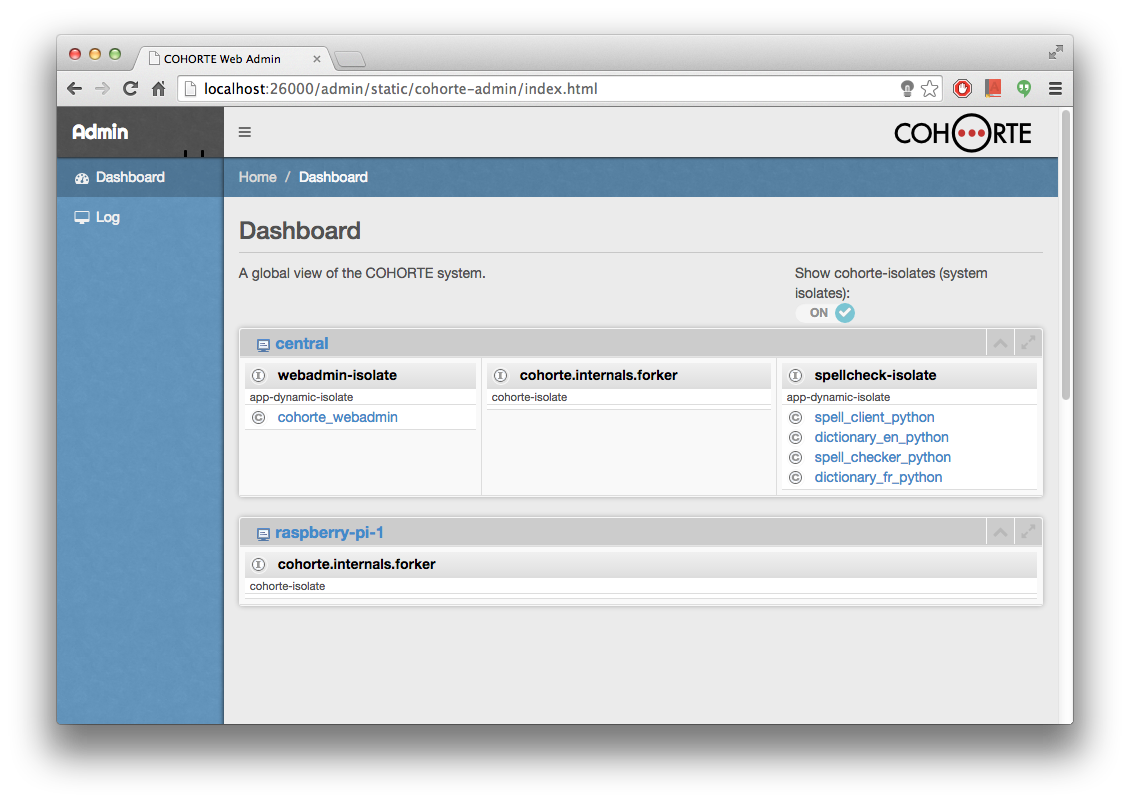Home > Documentation > Spellchecker
COHORET for Python
Welcome to COHORTE for Python! With COHORTE, you can build modular and resilient applications using the Python programming language, and take advantage of the many benefits of the COHORTE approach (see what is COHORTE?).
Spellchecker application
The application to develop in this tutorial provides a web interface in which users can check the spell of their sentences in one or another language. It concists of three main type of components as shown in the following picture:

- Dictionary components: implementing and providing the Dictionary Service. Each implementation indicates the language of the dictionary as a service property.
- Spell Checker: implements the Checker Service which take as input a sentence of words, and by using the Dictionary Service it verifies the existance of misspelled words. It uses the adequate provided Dictionary Services depending on user language choice. A list of missplened words are returned by this service.
- Spell Client: is a simple web interface that shows a form to the final user to test the application. This component uses the Checker Service for the application’s logic part, and it also requires an HTTP Service to publish the web interface and response to the form requests initiated by the user.
The required HTTP Service for the last component Spell Client is provided natively by the COHORTE runtime. No need to implement it! In the following, we show you how the different components are implemented in Python or Java programming languages.
Implementation
In this section, we will detail how the different components are implemented. For simplicity, we will not use a modern Integrated Developement Environment like eclipse, we rather create simple text files for the different Python code implementing our application components.
Check this page for instructions on how to use your prefered IDE like Eclipse (PyDev) or IDEA (PyCharm).
First, create a directory called spellcheckeron which you will put the different components.
Create a file called __init__.py within the spellchecker package folder. This file contains the name of the different services of our application as follow:
#!/usr/bin/python
SERVICE_DICTIONARY = 'demos.spellchecker.dictionaryService'
SERVICE_CHECKER = 'demos.spellchecker.checkerService'A COHORTE Component is implemented in python as a simple module with some specific class and method decorators. The following python code spell_dictionary_EN.py shows the implementation of the English Dictionary component.
English Dictionary
#!/usr/bin/python
from pelix.ipopo.decorators import ComponentFactory, Property, Provides, \
Validate, Invalidate
@ComponentFactory("dictionary_en_factory")
@Provides(spellchecker.SERVICE_DICTIONARY)
@Property("_language","language","EN")
class SpellDictionary(object):
def __init__(self):
self._dictionary = None
self._language = None
@Validate
def validate(self, context):
self._dictionary = {"hello" , "world", "welcome", "to", "cohorte"}
@Invalidate
def invalidate(self, context):
self._dictionary = None
def check_word(self, word):
word = word.lower().strip()
return not word or word in self._dictionaryWe have a simple Python module containing a class called SpellDictionary. In this module we have used several decorators defined and imported from pelix.ipopo package. This package (Pelix/iPOPO project) is our python supported component-based framework in COHORTE (For more information about the supported component-based models, check this page of the reference guide).
Here are some explanations of the meanning and effects of each decorator:
-
@ComponentFactoryallows COHORTE to consider this class as a component factory which is an object used to instantiate $Component*s of the classSpellDictionaryat runtime. The name given between parenthesis is the factory name. -
@Providesmakes this component as a service provider for the service given between parenthesis (SERVICE_DICTIONARY). This service has one method (check_word) that any provider should implement. -
@Propertyadd some contextual properties to the provider implementation of the service. Here in this example, we add the property language and set its value toEN. When another component requires the dictionary_service, it can filter the providers depending on this properties (for instance take only dictionary providers for english language - having language property set toEN).
In addition to this class decorators, we have also two method decorators:
-
@Validatelets the COHORTE runtime calls the decorated method when the component instance is lanched and is in a valid state. -
@Invalidatelets the COHORTE runtime calls the decorated method when the component is not valid (dependencies of this component are not resolved for instance).
The french dictionary implementation (not showed here) is mainly the same as the english implementation of the Dictionary Service. The only differences are the language property set to EN and the self._dictionary_ variable containing instead a set of french words.
We will now implement the Spell Checker service provider as shown on the following code :
Spell Checker
#!/usr/bin/python
from pelix.ipopo.decorators import ComponentFactory, Provides, \
Validate, Invalidate, Requires, BindField, UnbindField
import re
@ComponentFactory("checker_factory")
@Provides(spellchecker.SERVICE_CHECKER)
@Requires("_dictionaries", spellchecker.SERVICE_DICTIONARY, aggregate=True)
class SpellChecker(object):
def __init__(self):
self._dictionaries = []
self.languages = {}
@BindField('_dictionaries')
def bind_dict(self, field, service, svc_ref):
language = svc_ref.get_property('language')
self.languages[language] = service
@UnbindField('_dictionaries')
def unbind_dict(self, field, service, svc_ref):
language = svc_ref.get_property('language')
del self.languages[language]
def check(self, paragraph, language="EN"):
checked_list = re.split(" ", paragraph)
try:
dictionary = self.languages[language]
except KeyError:
return None
return [word for word in checked_list
if not dictionary.check_word(word)]This second component provides Checker Service and it requires Dictionary Service to operate on the input data. Notice that we have set the aggregate option of the @Requiresdecorator to true so that all the possible providers of the Dictionary Service are injected in the specified class attribute _dictionaries.
In addition to already explained decorators used in the first component, in this module we have used this two new decorators:
@BindField: calls the decorated method when a new provider of the Dictionary Service is detected at runtime. In this case, we want to get the service property language to construct a map of <language/provider> peers. This property is retrieved from the service reference svc_ref to the actual Dictionary Service provider.@UnbindField: calls the decorated method when one provider of the dictionary_service in no longer available. We update our internal map in response to this change.
The checker_service implemented by this component has one methdd check. It takes a paragraph and a language parameters and uses the available *Dictionary Service$ providers to check the spell of paragraph’s words. This service is used by the next component Spell Client.
Spell Client
#!/usr/bin/python
from pelix.ipopo.decorators import ComponentFactory, Provides, Property, \
Validate, Invalidate, Requires
from pelix.utilities import to_str
import pelix.remote
try:
import urllib.parse as urlparse
except ImportError:
import urlparse
@ComponentFactory("spell_client_factory")
@Provides(specifications='pelix.http.servlet')
@Property('_path', 'pelix.http.path', "/spellchecker")
@Requires("_checker", "checker_service")
@Property('_reject', pelix.remote.PROP_EXPORT_REJECT, ['pelix.http.servlet'])
class SpellClient(object):
def __init__(self):
self._path = None
self._checker = None
def do_GET(self, request, response):
"""
Handle a GET
"""
query = request.get_path()
query = query[query.rfind('?')+1:]
data = urlparse.parse_qs(query)
paragraph = ""
language = ""
result = ""
try:
paragraph = data['paragraph'][0]
language = data['language'][0]
language = language.upper()
misspelled_words = self._checker.check(paragraph, language)
if misspelled_words is None:
result = 'Dictionary provider for this language is not installed!'
else:
if not misspelled_words:
result = 'All words are well spelled !'
else:
result = "<b>The misspelled words are: </b>"
result += "<span style='color:red;'>"
result += " ".join(misspelled_words) + "</span>"
except (KeyError, IndexError):
result = "Fill the language and paragraph inputs!"
content = """
<html><head><title>SpellChecker</title></head><body>
<h2>Spellchecker Demo</h2>
<hr/>
<form action="/spellchecker" method="get" >
Language: <input type="radio" name="language" value="EN">EN
<input type="radio" name="language" value="FR">FR
<input type="radio" name="language" value="CN">CN<br/>
Paragraph: <input type="text" name="paragraph" size="50"/><br/>
<input type="submit" value="Check"/>
</form>
<hr/>
{result}
<hr/>
</body></html>
""".format(result=result)
response.send_content(200, content)This last component implements and provides the pelix.http.servlet so that it will be called by the web server when a request arrives. The HTTP Service provider (included in COHORTE) call the do_GET method of this component. In our example, we return via the response object a valid html page with a form asking the user to choose a language and put his sentence to check.
Running your application
To start running your awesome first COHORTE application, you need to download and install the COHORTE runtime platform in your local machine (see the setup section of the reference guide for more information).
In the following, we suppose that you have a Max OS X platform. Download the archive file of the COHORTE runtime from the downloads page (e.g., cohorte-1.0.0-macosx.tar.gz).
Extract the dowloaded file anywhere in your file system and create the environment Variable $COHORTE_HOME which has as value the fullpath to home sub-folder of the extracted archive file (note that you can just double click on home/setup.command file to setup this environment variable).
The home sub-folder contains the main COHORTE runtime libraries and configuration files. Whereas the base folder contains user-specific bundles and configurations. To run your spellchecker application you need to:
- move your spellchecker package folder to
base/repofolder. - fill the
base/conf/autorun_conf.jsfile with the description of application’s components to be instantiated (see more information about the formalism in the reference guide).
{
"name" : "spellchecker-demo-app",
"root" : {
"name" : "spellchecker-demo",
"components" : [ {
"name" : "dictionary_en",
"factory" : "dictionary_en_factory",
"language" : "python"
}, {
"name" : "dictionary_fr",
"factory" : "dictionary_fr_factory",
"language" : "python"
}, {
"name" : "checker",
"factory" : "checker_factory",
"language" : "python"
}, {
"name" : "spell_client",
"factory" : "client_factory",
"language" : "python"
} ]
}
}This description defines a new application named spellchecker-demo-appon which four components will be instantiated. The wiring between the different components is done automatically following the service-oriented architecture (service providers and service consumers) even if one component is placed in remote nodes (see COHORTE applications reference guide for more information on how to personalise your application’s architecture).
By default, with this minimal description, all the components will be instantiated in one Python isolate (as all the components are implemented in Python). Recall that a COHORTE Isolate is a seperate process (or a gateway) executing a set of components. The Python Isolate consists in Pelix platform hosting your different bundles as well as the needed system bundles (including the HTTP service provider).
COHORTE runtime components managing your application’s isolates and the distribution of components among them are located on a special purpose (static) isolate (called cohorte-isolate). There is one cohorte-isolateper node, but only one is started as a Top Isolate which manage all other isolates.
Next, you need to launch your application…
./run.sh -t -cFor more setup and startup configurations, please check this page.
Test your application
The resulting Spell Client looks like this:

The important quality of this architecture is the capability to update any component without restarting the global application. This is important to allow adding new Dictionary Services or updating a new efficient version of the Spell Checker component, without stopping the system and hence guaranting the continuity of business services.
The different application components can be deployed on different Isolates. This is important to ensure that a failure of one or more components does not affect the other ones. The isolation is managed automatically by COHORTE, this feature is explored with more details in this tutorial.
Monitoring

comments powered by Disqus

